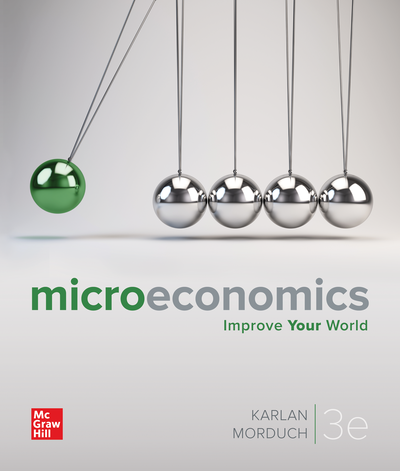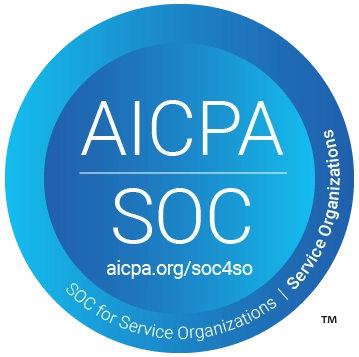Log In to My PreK-12 Platform


Microeconomics, 3rd Edition
Format Options:
-
Lowest Price!
eBook from $59.00 -
Print from $70.00 -
Connect from $127.29
McGraw Hill eBook
Textbook Rental (150 Days Access)
- Rent for a fraction of the printed textbook price
- Complete text bound in hardcover or softcover
Loose-Leaf Purchase
Unbound loose-leaf version of full text
Shipping Options
- Standard
- Next-day air
- 2nd-day air
Orders within the United States are shipped via FedEx or UPS Ground. For shipments to locations outside of the U.S., only standard shipping is available. All shipping options assume the product is available and that processing an order takes 24 to 48 hours prior to shipping.
Note: Connect can only be used if assigned by your instructor.
Connect (180 Days Access)
- Digital access to a comprehensive online learning platform
- Includes homework, study tools, eBook, and adaptive assignments
- Download the free ReadAnywhere app to access the eBook offline
Connect + Loose-Leaf
- Comprehensive online learning platform + unbound loose-leaf print text package
- Connect includes homework, study tools, eBook, and adaptive assignments
- Download the free ReadAnywhere app to access the eBook offline
Shipping Options
- Standard
- Next-day air
- 2nd-day air
Orders within the United States are shipped via FedEx or UPS Ground. For shipments to locations outside of the U.S., only standard shipping is available. All shipping options assume the product is available and that processing an order takes 24 to 48 hours prior to shipping.
* The estimated amount of time this product will be on the market is based on a number of factors, including faculty input to instructional design and the prior revision cycle and updates to academic research-which typically results in a revision cycle ranging from every two to four years for this product. Pricing subject to change at any time.
Instructor Information
Quick Actions (Only for Validated Instructor Accounts):
Improve YOUR world. Dean Karlan and Jonathan Morduch’s Microeconomics 3e is built around the central concept that economics is a powerful and positive tool that students can use right now to improve their world. Microeconomics uses examples and issues that resonate with students’ experience to draw them in and frame ideas to help develop their economic intuition.
- Using a balanced approach, students are able to sharpen their own understanding of topics by focusing on the data and evidence behind the effects they see. Students are equipped to understand and respond to real-life situations thought their new economic lens and challenged to decided how they will improve their world.
- The third edition delivers core economic concepts along with exciting new ideas in economic though and strives to keep students engaged by confronting issues that are important in the world.
- This text combines a familiar curriculum with material from new research and applied areas such as finance, behavioral economics, and the political economy. Students and faculty will find content that breaks down barriers between what takes place in the classroom and what happens in our nation and our world, with applications that are driven by empirical evidence, data, and research.
- Karlan and Morduch show students that economics is a tool to improve one's own life and promote better public and business policies in the world. At the same time, this third edition challenges students to reach their own conclusions about how they will improve their world.
Chapter 1: Economics and Life
Chapter 2: Specialization and Exchange
Chapter 3: Markets
Chapter 4: Elasticity
Chapter 5: Efficiency
Chapter 6: Government Intervention
Chapter 7: Consumer Behavior
Chapter 8: Behavioral Economics: A Closer Look at Decision Making
Chapter 9: Game Theory and Strategic Thinking
Chapter 10: Information
Chapter 11: Time and Uncertainty
Chapter 12: The Costs of Production
Chapter 13: Perfect Competition
Chapter 14: Monopoly
Chapter 15: Monopolistic Competition and Oligopoly
Chapter 16: The Facts of Production
Chapter 17: International Trade
Chapter 18: Externalities
Chapter 19: Public Goods and Common Resources
Chapter 20: Taxation and the Public Budget
Chapter 21: Poverty, Inequality, and Discrimination
Chapter 22: Political Choices
Chapter 23: Public Policy and Choice Architecture
Main Features
- LMS Integration
- Print/Loose-Leaf Book Add-On Availability
- Presentation Slides & Instructor Resources
- Question & Test Banks
- Adaptive Assignments
- Student Progress Reporting & Analytics
- Essay Prompts
- Polling
- Prebuilt Courses
- Interactive Exercises
- eBook Access (ReadAnywhere App)
- Remote Proctoring (Proctorio)
- Subject-Specific Tools
About the Author
Dean Karlan
Dean Karlan is Professor of Economics and Finance at Northwestern University and President and Founder of Innovations for Poverty Action (IPA). Dean started IPA in 2002 with two aims: to help learn what works and what does not in the fight against poverty and other social problems around the world, and then to implement successful ideas at scale. IPA has worked in over 50 countries, with 1,000 employees around the world. Dean’s personal research focuses on using field experiments to learn more about the effectiveness of financial services for low-income households, with a focus on using behavioral economics approaches to improve financial products and services. His research includes related areas, such as building income for those in extreme poverty, charitable fund-raising, voting, health, and education. Dean is also co founder of stickK.com, a start-up that helps people use commitment contracts to achieve personal goals, such as losing weight or completing a problem set on time, and in 2015 he founded Impact Matters, an organization that helps assess whether charitable organizations are using and producing appropriate evidence of impact. Dean is a Sloan Foundation Research Fellow, a Guggenheim Fellow, and an Executive Committee member of the Board of the M.I.T. Jameel Poverty Action Lab. In 2007 he was awarded a Presidential Early Career Award for Scientists and Engineers. He is co editor of the Journal of Development Economics and on the editorial board of American Economic Journal: Applied Economics. He holds a BA from University of Virginia, an MPP and MBA from University of Chicago, and a PhD in Economics from MIT. In 2016 he coauthored Failing in the Field, and in 2011 he coauthored More Than Good Intentions:Improving the Ways the World’s Poor Borrow, Save, Farm, Learn, and Stay Healthy.
Jonathan Morduch
Accessibility
Creating accessible products is a priority for McGraw Hill. We make accessibility and adhering to WCAG AA guidelines a part of our day-to-day development efforts and product roadmaps.
For more information, visit our accessibility page, or contact us at accessibility@mheducation.com
Affordability
Reduce course material costs for your students while still providing full access to everything they need to be successful. It isn't too good to be true - it's Inclusive Access.
Need support? We're here to help - Get real-world support and resources every step of the way.


